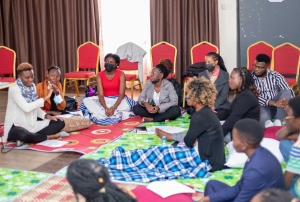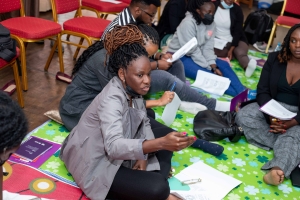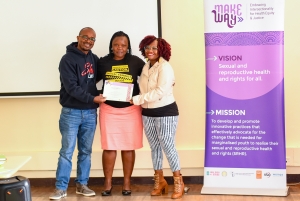Globally, women, girls, and gender-expansive persons demand a better healthcare system from their governments and policymakers. In East Africa, there has been a massive campaign for the passage of the East Africa Community Sexual and Reproductive Health Bill #EACSRHBill by feminists, civil society organizations, and young people. Ultimately, the Bill is positioned to improve women, girls, and marginalized groups’ sexual and reproductive health and rights (SRHR) in six East African countries. Unfortunately, the debates around the Bill have been mainly influenced by religious and traditional fundamentalists and anti-prochoice groups. As a result, the decisions about the lives and bodies of women and marginalized groups remain debated by people with limited knowledge about the SRHR needs of African women, girls, and marginalized groups.
It further proved the urgency to promote a new way of regarding and organizing SRHR issues, mainly through an intersectional lens. Therefore, in July 2022, AMwA, through its flagship programme, the African Women’s Leadership Institute (AWLI), and in line with its strategic pillar on feminist and transformational leadership development, conducted a national-level capacity strengthening training on intersectional SRHR advocacy in Kenya. The objective of the training was to enhance the capacity of our Consortium partners, collaborating partners, and youth panel members under the Make Way programme on intersectional SRHR lobby and advocacy in Kenya. In the tranquility of Stoni Athi resort, AMwA gathered 25 participants for the one-week in-depth and interactive sessions on feminist theory, intersectionality, understanding of SRHR to legal and policy frameworks in Africa and Kenya, and feminist advocacy for SRHR.

The first full day started with a session on understanding feminist theory. Leah Eryenyu, Head of Programmes at AMwA, explained the different theories and types of feminism. She used stories to unpack the definition and analysis of power, and the participants could identify the various systems of power as capitalism, patriarchy, colonialism, and so on. She further unpacked discrimination with participants as compounded vulnerabilities that predispose different identities to oppression and discrimination. In the same breadth, Buky Williams, the SRHR lead at AMwA, engaged the participants on how to deconstruct power, the different types and levels of power, and the importance of knowing who holds visible, invisible, and hidden powers when advocating for SRHR.
“I am happy to be in this space because, in most spaces, marginalized women are often not included. However, as a sex worker, my voice is valued, and my participation in this space is also appreciated. I have learned the importance of intersectional advocacy, and I will adopt it in my organization and work.’ – Elizabeth Atieno
The second day progressed graciously with sessions on intersectionality and understanding SRHR. Leah and Buky’s goal for the day was to ensure that participants were grounded in a deeper understanding of intersectionality and SRHR from an intersectional framework.
First, Leah simplified the concept of intersectionality with case studies to ensure participants grasped further and related to the ideology. Then, through group exercises, she introduced participants to methods and approaches of using an intersectional framework in their advocacy. Finally, Buky ended the day’s session by emphasizing the importance of advocating for SRHR for all, especially groups with compounded vulnerabilities, that is, adolescents, people with disabilities, sexual minorities, sex workers, and so on. Likewise, using the gender bread image, she explained the spectrum of sexual orientation, gender identity, and sexuality.
Sofia Rajab, a feminist lawyer, enthusiastically took the session on the various legal and policy instruments of SRHR in Africa with a focus on Kenya and the East Africa Community (EAC). Furthermore, she explained the Maputo protocol and its point of reference in advancing SRHR in Africa.

“From this training, I have understood the principles of feminism and intersectionality, and I am looking forward to putting this into practice by developing and working in people-centered programs.” Sheila Warindi.
Tabitha Saoyo, a feminist lawyer, took the participants through the last session on feminist advocacy for SRHR. Tabitha introduced her session by engaging the participants in a values clarification exercise to stress that SRHR advocacy must be intersectional. Next, she shared the techniques needed to set an advocacy goal, understand the targets, and develop key messages to capture the target audience’s attention. Tabitha also shared documentaries and advocacy campaigns used for SRHR advocacy in Kenya. Lastly, she encouraged the participants to identify best practices and alternatives to doing things differently.
After a long and intensive week of learning and unlearning comes moments of reflection, renewed energy, and convictions. Dr. Stellah Bosire, a Medical Doctor and Feminist, was present to give the closing remarks during the closing ceremony. She charged the participants to use the transformative knowledge and collective power they have learned from the training to advocate for inclusive SRHR. Dr. Johnstone Kuya DrPH, Kenya representative at the Ministry of Foreign Affairs at the Dutch Embassy of the Kingdom of the Netherlands, encouraged participants to continue advocating for silent issues such as access to safe abortion and comprehensive sexuality education. In addition, he urged them to continue investments in opposition and anti-gender groups that threaten the gains on SRHR in Kenya.
Heartily, participants received certificates presented by AMwA with support from Dr. Stella Bosire and Johnstone Kuya DrPH and departed with an intersectional and reformed SRHR advocacy vision.
